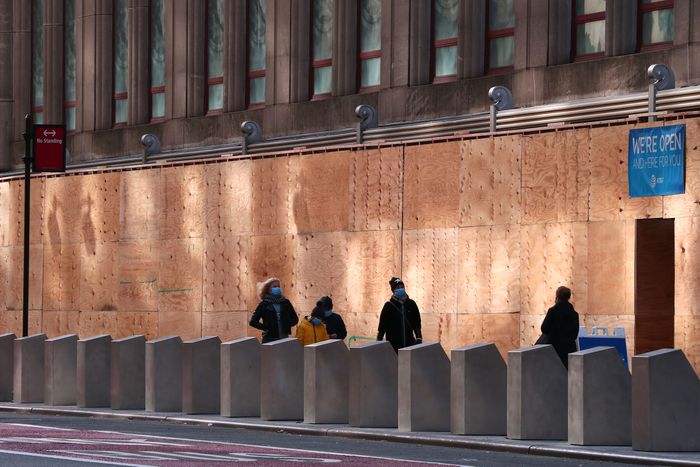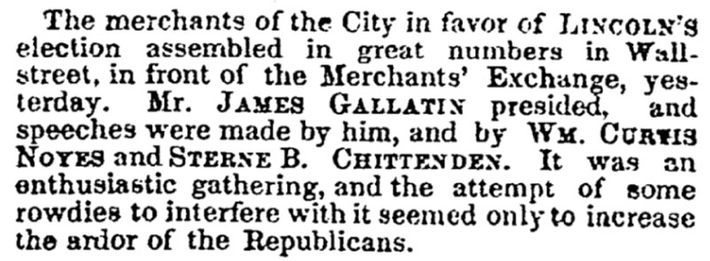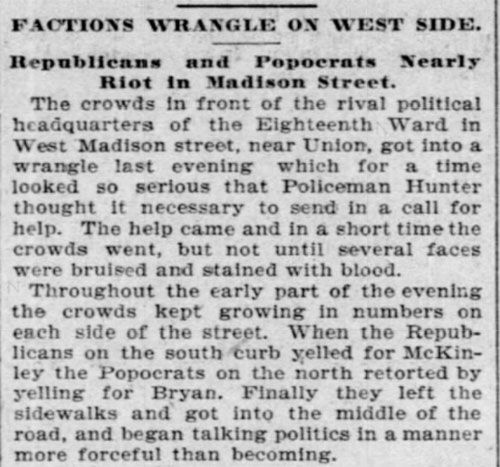
As America holds its breath for the results of this election, business owners have put up plywood for the second time in half a year, fearing a return of the mass protests and looting from this past summer. (Even Donald Trump’s Hollywood Walk of Fame star is covered up.) With the current president doing all he can to delegitimize the results if they do not favor him, and with various legal strategies reportedly afoot to declare victory before the votes are fully tallied while simultaneously claiming that his opponent cheated, the nation is on edge. The NYPD has already prepared for a kind of low-grade martial law if things start to get out of hand. That seems unprecedented.
But is it? There have, of course, been mass protests in the past, some of them instigated by a particular outrage and turning violent, but did they specifically stem from election-related anger? I went back today and read newspaper coverage from the weeks before several elections that seemed as though they might have incited strong feelings: 1860, 1864, 1968, 2000, and a couple of others. I saw surprisingly few protests specific to the election itself.
There were, of course, public dissents all over those years, especially in 1968: Antiwar marches occurred throughout much of the year, after Martin Luther King Jr.’s assassination in April (an uprising in Harlem was headed off partly by Mayor Lindsay’s swift decisionto walk those uptown streets in solidarity) and related to the Democratic National Convention in Chicago that August. And indeed there were a few eruptions on the morning after Richard Nixon’s election: Protests cropped up around Rockefeller Center and in Times Square and in Lafayette Park across from the White House. At Rutgers–Newark, some glass doors were smashed. Marchers called the election “a fraud” and “a hoax,” although they probably were not alleging actual ballot fakery but rather a general Nixonian sneakiness. But not a single story mentioned boarded-up windows in advance. A Reuters report preceding the election said that young people had plans for pranksterish events: releasing pigs to run in the streets, stripping naked in voting booths. (The latter was to happen in San Francisco.)
In 2000 in Florida, the biggest disruption seems to have been the so-called Brooks Brothers riot, in which a bunch of conservative activists demonstrated loudly in an attempt to shut down the vote recount. As we eventually learned, the whole thing was backed by the GOP Establishment, with Matt Schlapp and Roger Stone among the organizers. (The legal team behind the stop-the-recount push included Brett Kavanaugh, Amy Coney Barrett, and John Roberts, a third of today’s Supreme Court.) That event, despite its nickname, was less grassroots protest than performance: It was really a bunch of operatives and lawyers, operating and lawyering.
How about in the 19th century? Judging by the 1860 and 1864 coverage in the Times, there wasn’t street-level violence of note in the aftermath of the election. When I called up Bruce Schulman, a professor of history at Boston University, he agreed — although, he was quick to point out, “in 1860, the aftermath was the secession of seven southern states, leading to civil war! So there was tremendous discontent with the results, but I can’t think of any examples of Election Day protests. And not in 1864, either.” I did discover one little dustup between Wall Street guys (backing Abraham Lincoln) and some “rowdies,” but it doesn’t seem to have been much of a battle. The draft riots, which tore apart New York in 1863, were of course a secondary effect of secession and the war which resulted.
But Schulman did flag an election, one that he has studied closely, when it happened. “In 1896,” when William McKinley was elected over William Jennings Bryan, “supporters of the rival candidate rioted, more or less. The beat officer for the 18th Ward had to summon reinforcements to control the crowd. The Chicago Daily Tribune, as it was called then, reports that crowds did not diffuse until people were bruised and ‘stained with blood.’ And in Manhattan, police tangled with the crowd that was obstructing streetcars, and the New York Times report talks about immense throngs, lively, enthusiastic, parading up and down Broadway from 23rd to 42nd Street, yelling and shouting and causing disruption. So in Chicago, we see a tangle between groups supporting candidates, and violence. In New York, it’s more excited, a little like turning over cars to celebrate victory after a sporting event.”
Another scholar who studies this period, Gideon Cohn-Postar — he’s a postdoctoral fellow at the Andrea Mitchell Center for the Study of Democracy at the University of Pennsylvania — reminded me of the Wilmington Massacre, the horrific 1898 event in which brutality explicitly descended from an election result. “Reconstruction was pretty much over, white supremacists were asserting control, and in Wilmington, North Carolina, African Americans and white moderates formed a fusion party and won control in a city election. And a few weeks after, a large group of white citizens gathered up guns, including a machine gun — the very early use of a machine gun! — and marched through town. We still don’t know how many people died.” (One estimate is 300.) “The mayor and other officials were forced to resign at the point of a machine gun. William McKinley, the Republican president who supported African American voting rights, did nothing.” In other places, polling places were sometimes moved in advance of elections to forestall unrest: Cohn-Postar told me about one 1880 South Carolina election in which “the polling place was going to be in a market hall where lots of people had their businesses, and because people expected violence, there was a demand that it be moved to the courthouse. And there was [violence], although I don’t think anybody died.” That particular uprising was, as in Wilmington later on, meant to return political power to white people.
And indeed a lot of election-related violence has historically been about that, notes Ashley Howard, an assistant professor of African American history at the University of Iowa. “Thinking about this particular night of mayhem, the closest thing I could think of was off-season local elections, like all the violence surrounding Kansas and whether it was going to be admitted into the Union as a free state. There’s a lot of violence around the Know Nothing party in the 1850s, particularly a riot in 1855 in Cincinnati, and that was a local election, not a presidential one. And then through the Reconstruction era, there’s uprisings, riots, voter suppression.” But she adds, correctly, that there’s always a slow build before a public disruption happens. “In March 2016, Trump said that if he didn’t get the nomination, there’d be riots. And when you look back over the past two or three years, you see this ramping up of a moment where violence is a real possibility. When we think about Charlottesville, about the number of cars that drive into protests, when you think about policing in Black neighborhoods, the possibility of violence should not be surprising.” Often, she reminded me, the focus in conversations about protests like these is about the result — property damage — rather than the things fueling the fire that in turn brings the pot to a boil. When I called her, she happened to be prepping to give a class on the Civil War.
One big difference between then and now, Schulman remarked to me, is that the nature of an election in that era was inherently more boisterous. Local leaders of ethnic and social and other groups were informally deputized to deliver their blocs of voters: A neighborhood Irish boss, say, would be rewarded for getting his few hundred blue-collar Irishmen to the polls to vote for the Democratic slate. So there weren’t exactly protests, but there was definitely mayhem. “Remember, 19th-century elections in New York, and in cities in general, would have featured large amounts of alcohol because that’s how you got your armies of voters to the polls. There would have been riotous behavior, and undoubtedly some merchants would have closed shop. Many things like food, music, drink were so important to turning out your army.” Tonight, it may be a lot of socially distanced takeout.
"had" - Google News
November 04, 2020 at 07:42AM
https://ift.tt/3oQfTd7
There Have Been Relatively Few Election Night Riots in American History. So Far. - Curbed
"had" - Google News
https://ift.tt/2KUBsq7
https://ift.tt/3c5pd6c
Bagikan Berita Ini
















0 Response to "There Have Been Relatively Few Election Night Riots in American History. So Far. - Curbed"
Post a Comment